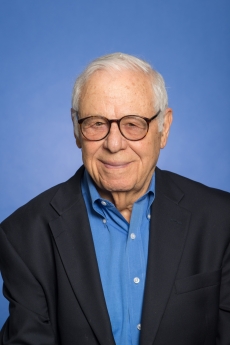 |
| Etzioni, from the GWU website |
In his latest piece, Etzioni takes aim at a tendency prominent in the American political conversation today to state an opposition between the public (government) and private (business) sectors, and to blame one or the other--usually, government--for the woes of America. Etzioni "argues that the frequently employed distinction between the public and the private realms is becoming increasingly obsolete because the two realms are intertwined, move in tandem, and seem to be codetermined [i.e. interaction between them drives both, rather than either driving the other] (p. 39)." The real world looks quite different from libertarian and socialist (or, for that matter, Republican and Democratic) discourse. He cites other scholars--including historians William J. Novak and Elisabeth S. Clemens, and economist Karl Polanyi--who make a similar case. In Novak's words:
The most compelling analyses of American power have always refused to split the problem along a single either-or, public-private binary (for example, the people vs. the interests; public good vs. private right; the state vs. the individual; regulation vs. the market). Instead, realistic and pragmatic approaches to American state development emphasize the interpenetration of public and private spheres--the convergence of public and private authority in everyday policymaking ("The Myth of the 'Weak' American State," American Historical Review 113 (2008), 769-770, quoted by Etzioni on p. 45) .
Etzioni cites four contemporary digital-age examples in support of his argument: use by the private sector of government-issued social security numbers as individual identifiers; government use of information on individuals gathered by private firms, including contracts with data mining firms Choicepoint and SesInt; policy making, or the lack thereof, for cybersecurity; and the formation of individual value preferences. Imagining a public-private divide, he concludes, was a "very useful fiction" at the dawn of the modern age when concepts of individual liberty were being formulated. Using it as the basis for your whole worldview, however, "now obscures the underlying social dynamics, the powers that drive history, and the ways in which they may be redirected" (p. 61).
Etzioni's argument makes a lot of sense to me, so much so that I had it in the back of my mind to blog about the problem even before his article appeared. No government policy today is formulated without the hands of business being all over it, and very few are implemented that way. (I can't think of any offhand, but there may be some.) Individual entrepreneurship is not diminished by the fact that government has for generations been intricately involved in the national economy. The 2012 campaign kerfuffle over Obama's saying "You didn't build that" was simply and shamelessly disingenuous.
(Denver International Airport, from commons.wikipedia.org)
Similarly, the widespread phenomenon of metropolitan sprawl--a subject of many entries in this blog--is not the product either of government or private enterprise run amok. Governments and developers have been collaborating at this for a long time, which may have at one time seemed socially but is now clearly dangerous and darned hard to change. Developers build subdivisions for the most part because they're profitable, and federal and local government tax policies and subsidies support their construction.
For that matter, the coming health care regime is not "government-run health care" as conservative propagandists would have it. If it were, it wouldn't be so complicated! It is a series of regulatory and incentive-oriented patches on the existing health care system, which is a complicated mix of private, public and non-profit institutions and funding. Someone named Wayne Madsen wrote in an op-ed in today's Cedar Rapids Gazette: "What's generally termed Obamacare wasn't the brainstorm of President Barack Obama, but a 'witches' brew' concocted in 2010 by Senate Majority [Leader] Harry Reid and then House Speaker Nancy Pelosi with generous advice from Big Pharma, Big Insurance and the AARP." Snarky, but accurate. Even if his wish for a single-payer insurance system comes true some day, it will still rely on market mechanisms, if not actual private firms.
Independent entrepreneurs striving honorably to solve the needs of all until they are undone by feckless government officials--that's a story Americans like to tell themselves. Not to say it doesn't occasionally happen: Not all regulation is cost-effective, and government can be awfully slow to respond to negative feedback. But by the same token, if business just charges processing fees without substantive value (the 21st century business model?) then you wind up with the pre-Obama student loan program.
In the real world, figuring out solutions to public problems starts with clearly recognizing that much of American public life today is an intertwining of the three (public, private, non-profit), where there is tension but not pure opposition between them. There's probably good reason for this: For the most part, it's been shown over a long period of time to work. Socialist experiments have in the past spectacularly failed, and libertarian worlds either exist mostly as myth (the American frontier) or failed too (American commercial structure before the Great Depression). Anyone who pretends otherwise is blowing smoke, or selling something, or both.
SOURCE: Amitai Etzioni, "The Bankruptcy of Liberalism and Conservatism," Political Science Quarterly 128:1 (Spring 2013), 39-65.




No comments:
Post a Comment